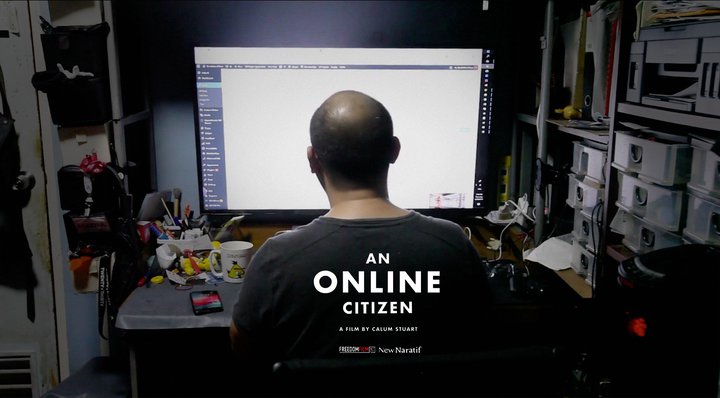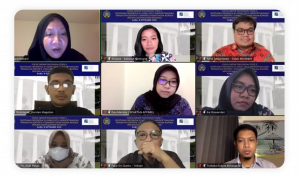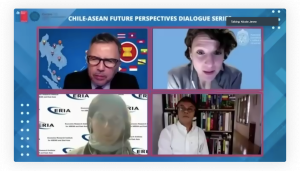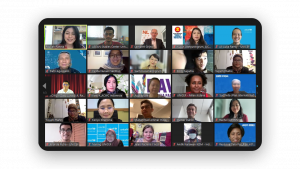The international webinar titled “Economic Integration in ASEAN and East Asia: Trends and Prospects post Covid-19” commenced on Thursday, 23 September 2021, and was arranged by the Center for Southeast Asian Studies (CSEAS). The webinar invited six speakers from several backgrounds and expertise to discuss economic trends and prospects of economic integration in ASEAN and in East Asia. The webinar also covered the progress of Green Economy and Regional Digital Economic post-Covid-19. The webinar was opened by the opening remarks from Steve Chen (Taipei Economic and Trade Office) and moderated by Arisman from CSEAS. The ASEAN Studies Center was invited to join the discussion, represented by Tunggul Wicaksono (Research Manager, ASC UGM).
The first speaker, Dr Aladdin Rillo (Senior Economic Advisor, Economic Research Institute for ASEAN and East Asia), presented supply chain resilience to support the connectivity trade among states. The resilience itself is being emerged by the unique characteristics such as; mostly private sector endeavours, diverse production sources, and coordination of interested parties. The findings show that the pandemic so far did not disrupt the production flow in the East Asia region. Bigger private sector dynamism, in which companies in the region can perform well and achieve a positive outlook. Moreover, the utilization of digital technology is very helpful to mitigate the harmful impacts of the pandemic. There are ways forward to enhance and sustain the supply chain in the longer term; work together with the private sector to identify the origin of supply and alternative sources, scaling-up digital acceleration to strengthen the circularity of the supply chain, and build stronger supply networks to enhance the sustainability and efficiency in production.
The second speaker, Dr Amalia Adininggar Widyasanti (Deputy Minister for Economic Affairs, Ministry of National Development Planning/Bappenas, Republic of Indonesia), explained the recovery gap resulting from Covid-19 on global integration affecting global value chains in the region. Dr Amalia also mentioned the ASEAN’s role in supporting the trade flow. In this sense, the role of labor market policy is essential to be the key driver of technological progress and productivity growth. East Asia is one of the most significant import sources for ASEAN, and ASEAN itself is the top three exporters in Asia. There are opportunities to enhance the collaboration between two regions related to the manufacturing sector, labor-intensive industry, and technology.
The third speaker, Dr Jayant Menon (ISEAS Yusof Ishak Singapore), addressed the impact and adjustment of ASEAN’s economic impact and how to adjust to the new normal related to digital disruption and divergent demographics. The pandemic, in a way, reinforcing the trends that are undermining globalization in the form of nationalism sentiment and protectionism (sometimes referred to as rebalancing, reshoring, resilience). The geopolitical issues involved need to be addressed by the implementation of regional agreements such as AEC, RCEP, and CPTPP. The presentation concluded with the proposal to overcome the issues by starting planning to open borders, improving the digital economy that may increase inclusivity, and enhancing trade liberalization through the regional arrangement.
The fourth speaker, Prof Raldi Hendro Koestoer from Coordinating Ministry of Economic Affairs, Republic of Indonesia, presented circular economy in Indonesia. Online-based services are supporting the path to economic recovery in Indonesia. He concluded that the government must provide a secure guideline in financial regulation to support the strategic initiative.
The fifth speaker, Dr Roy Chun Lee (Associate Research Fellow, Director, The Economic Law Research Center, Taiwan), presented the topic of economic rivalry in the global supply chain and regional integration. The world in 2021 is challenged by multiple key dimensions of change, including the elevating relationship, reconfiguration of the supply chain, green security, and uncertainty of supply chain reform among the states. Moreover, deep integration issues include human capacity, STEM capacity, cross-border finance, and digital transformation.
The last speaker, Dr Cyn-Young Park (Director of Regional Cooperation and Integration Division Economic Research and Regional Cooperation Department, Asian Development Bank), presented Asia’s financial integration that is in the downturn during the pandemic even though over the past few decades, there has been a gradual increase in regional cooperation. Concerning trade, supply chain, and investment for post-Covid-19, there is momentum in implementing non-tariff measures while at the same time limiting the trade barriers. Another way is to embrace the evolution of digital trade, which is comprised of online support and e-commerce. Therefore, there is an urgency to enhance the affordability and access of ICT, improve logistics and delivery infrastructure, intensify the regional effort in regulation, broaden the e-payment availability, and institute legal and regulatory reforms.
To sum up the discussion, there is a possibility for ASEAN to address the issue of sustainability by ASEAN Economic Community framework. On a larger scale, Asia’s regional integration will continue to deepen with varying dimensions in the subregions. Even though Covid-19 threatens to reverse progress attained by open trade, investment, and mobility, digitalization can help recover and reconnect the cooperation among states.



 The discussion has invited Dr. Randy W. Nandyatama as the book’s author and senior researcher at ASEAN Studies Center UGM. Furthermore, several academicians and practitioners on human rights advocacy were also invited to enliven the discussion. H. E Yuyun Wahyuningrum as Representative of Indonesia at AICHR and Senior Advisor at HRWG, Assoc. Prof. Anthony J. Langlois as an Associate Professor from College of Business, Government, and Law at Flinders University, and Asst. Prof. Deepak Nair as Assistant Professor of the Political Science National University of Singapore. The discussion was moderated by Yulida Nuraini Santoso as the Managing Director of ASEAN Studies Center UGM.
The discussion has invited Dr. Randy W. Nandyatama as the book’s author and senior researcher at ASEAN Studies Center UGM. Furthermore, several academicians and practitioners on human rights advocacy were also invited to enliven the discussion. H. E Yuyun Wahyuningrum as Representative of Indonesia at AICHR and Senior Advisor at HRWG, Assoc. Prof. Anthony J. Langlois as an Associate Professor from College of Business, Government, and Law at Flinders University, and Asst. Prof. Deepak Nair as Assistant Professor of the Political Science National University of Singapore. The discussion was moderated by Yulida Nuraini Santoso as the Managing Director of ASEAN Studies Center UGM. “Sittwe” is a story about two teenagers from opposing sides of deadly religious and ethnic conflict. The movie provides voice to the youth in a deeply divided society, to create a space for dialogue about reconciliation. Phyu Phyu Than is a Rohingya Muslim girl and Aung San Myint is a Buddhist boy from Myanmar. Both saw their homes burned down during communal violence in 2012. In the discussion, Jeanne Hallacy highlighted the issue of education which is part of human rights and social justice. Mr. Irawan Jati highlighted conflict resolution in the states, in which the current unstable political situation on Myanmar is a sincere narrative of survival. Meanwhile. Lastly, Thiha Wint Aung as the representative of youth from Myanmar in this discussion, he explained the history of the conflict, how the conflict could have occurred and how is the current condition of Myanmar. The discussion about the movie “Sittwe” became more interesting with a Q&A session with the participants of this event.
“Sittwe” is a story about two teenagers from opposing sides of deadly religious and ethnic conflict. The movie provides voice to the youth in a deeply divided society, to create a space for dialogue about reconciliation. Phyu Phyu Than is a Rohingya Muslim girl and Aung San Myint is a Buddhist boy from Myanmar. Both saw their homes burned down during communal violence in 2012. In the discussion, Jeanne Hallacy highlighted the issue of education which is part of human rights and social justice. Mr. Irawan Jati highlighted conflict resolution in the states, in which the current unstable political situation on Myanmar is a sincere narrative of survival. Meanwhile. Lastly, Thiha Wint Aung as the representative of youth from Myanmar in this discussion, he explained the history of the conflict, how the conflict could have occurred and how is the current condition of Myanmar. The discussion about the movie “Sittwe” became more interesting with a Q&A session with the participants of this event. “Standing on the Edge of a Thorn” is an intimate portrait of a family in rural Indonesia grappling with poverty, mental illness, and participation in the sex trade. The movie has succeeded in portraying how gender violence issues happened. During the discussion, Dr. Robert Lemelson, Ph. D has highlighted that this movie has brought up the issue of gender violence, which was previously considered a taboo subject to be discussed by the public. Even though the problem is happening a lot and affects the psychology of other family members, it is still considered taboo to bring up this issue. Ninik Supartini, M. Si. has also stated her efforts to approach people to recognize gender violence. According to her, gender violence is a structural issue and requires a prolonged approach to resolve it. Indiana Puspa Dewi, S.S., MA, a Ph.D., has also stated the importance of maximizing the village’s cultural background and situation to handle cases of gender violence in the community. The discussion also became more interesting with the Q&A session with participants of this movie screening.
“Standing on the Edge of a Thorn” is an intimate portrait of a family in rural Indonesia grappling with poverty, mental illness, and participation in the sex trade. The movie has succeeded in portraying how gender violence issues happened. During the discussion, Dr. Robert Lemelson, Ph. D has highlighted that this movie has brought up the issue of gender violence, which was previously considered a taboo subject to be discussed by the public. Even though the problem is happening a lot and affects the psychology of other family members, it is still considered taboo to bring up this issue. Ninik Supartini, M. Si. has also stated her efforts to approach people to recognize gender violence. According to her, gender violence is a structural issue and requires a prolonged approach to resolve it. Indiana Puspa Dewi, S.S., MA, a Ph.D., has also stated the importance of maximizing the village’s cultural background and situation to handle cases of gender violence in the community. The discussion also became more interesting with the Q&A session with participants of this movie screening. The discussion was led by Research Lead, Pulung Setiosuci Perbowani and gathered 8 panelists representing (1) the marketplaces, namely Balques Manisang (Shopee); Ferdi Anggriawan (Go-Jek); Bondan Trihadi Magetian (Bukalapak); (2) e-commerce business actors: Dea Mariska Aprillah (Spartan Apparel); (3) Consumer: Ika Kurnia Riswandari (Indonesian, ASEAN, and Southeast Asian user of marketplaces); (4) Financial Technology/Financial Authority: Andi Adityaning Palupi (Bank Indonesia Daerah Istimewa Yogyakarta); and Fajar Eri Dianto (Telkom); and (5) Academia: Traheka Erdyas Bimanatya (Macro-Economist UGM).
The discussion was led by Research Lead, Pulung Setiosuci Perbowani and gathered 8 panelists representing (1) the marketplaces, namely Balques Manisang (Shopee); Ferdi Anggriawan (Go-Jek); Bondan Trihadi Magetian (Bukalapak); (2) e-commerce business actors: Dea Mariska Aprillah (Spartan Apparel); (3) Consumer: Ika Kurnia Riswandari (Indonesian, ASEAN, and Southeast Asian user of marketplaces); (4) Financial Technology/Financial Authority: Andi Adityaning Palupi (Bank Indonesia Daerah Istimewa Yogyakarta); and Fajar Eri Dianto (Telkom); and (5) Academia: Traheka Erdyas Bimanatya (Macro-Economist UGM).
 The discussion highlighted a number of issues including the role of CSOs and the academic community which is to support the State in undertaking the obligation as duty bearer in fulfilling the rights of Children, to contribute to CRC Alternative Report CRC in order to support the government efforts on implementing CRC including ensuring child participation, to undertake research on the situation and well-being of women and children, and contribute on implementing Concluding Observation of CRC beneficial as foundation works on measures to child rights realizations.
The discussion highlighted a number of issues including the role of CSOs and the academic community which is to support the State in undertaking the obligation as duty bearer in fulfilling the rights of Children, to contribute to CRC Alternative Report CRC in order to support the government efforts on implementing CRC including ensuring child participation, to undertake research on the situation and well-being of women and children, and contribute on implementing Concluding Observation of CRC beneficial as foundation works on measures to child rights realizations.